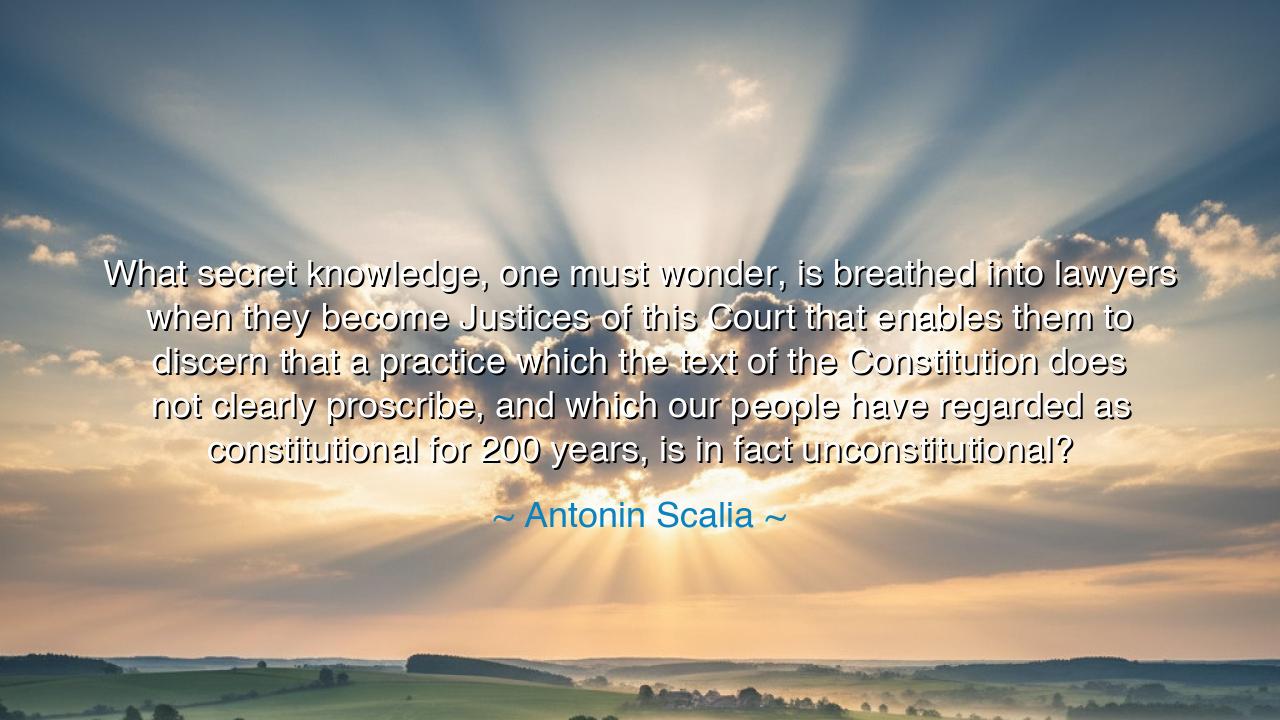
What secret knowledge, one must wonder, is breathed into lawyers
What secret knowledge, one must wonder, is breathed into lawyers when they become Justices of this Court that enables them to discern that a practice which the text of the Constitution does not clearly proscribe, and which our people have regarded as constitutional for 200 years, is in fact unconstitutional?






Hear now the thunderous words of Antonin Scalia, a jurist who stood as both warrior and guardian of the ancient text, who asked with sharp tongue and sharper mind: “What secret knowledge, one must wonder, is breathed into lawyers when they become Justices of this Court that enables them to discern that a practice which the text of the Constitution does not clearly proscribe, and which our people have regarded as constitutional for 200 years, is in fact unconstitutional?” These words are not mere complaint, but a challenge, a rebuke to the arrogance of those who would claim wisdom beyond the written law, and a defense of the principle that the text itself must bind both rulers and ruled.
In this cry, Scalia invokes a suspicion as old as governance: that some, once seated in power, begin to believe they possess hidden knowledge, a light denied to ordinary men. He mocks the notion that the robes of office imbue mystical insight, that the judge becomes more than man and can divine meanings the people never placed within the text. For Scalia, the Constitution is not a riddle for oracles but a covenant written in plain words, forged by the people, and sustained by their consent. To depart from its text is to betray both law and liberty.
History offers many mirrors to this struggle. In the days of Rome, senators often cloaked their ambition in the language of divine sanction, claiming that the gods whispered guidance that justified their decisions. Yet when laws were twisted to suit pride or faction, the republic itself withered. In contrast, the Twelve Tables, simple and fixed, gave clarity and stability to the Roman people. Scalia’s lament draws from the same truth: that when rulers pretend to hear secret voices in the law, the republic falters, but when they remain bound to the text agreed upon, the people are secure.
The force of his words also carries a warning against the tyranny of interpretation unmoored from history. For if a practice has stood for two hundred years, respected by generation upon generation, how can it suddenly be declared forbidden, unless judges claim some hidden power? This is no light matter, for it raises the specter of government by will, not by law. To Scalia, such claims are not acts of enlightenment, but of hubris—of men believing themselves wiser than both the framers of the document and the long tradition of the people who lived beneath it.
Yet his words are not a rejection of interpretation altogether, but a call to humility. He reminds us that judges are not prophets but servants, not masters of the text but its guardians. To invent new meanings where the text is silent is not to preserve the Constitution but to unmake it. The true task of a justice is not to breathe new knowledge into the law, but to faithfully apply what is written, leaving change to the people and their representatives.
The lesson for us, O seekers of truth, is this: in every sphere of life, beware the temptation to exalt yourself as holder of hidden wisdom. Whether in law, in leadership, or in family, humility demands that we honor the agreements and words already spoken before we claim authority to alter them. Guard yourself against the arrogance that whispers, “Only I see clearly,” and instead strive to remain faithful to the foundations upon which trust is built.
In practice, this means anchoring yourself to principles, not to whims. Read the texts—be they sacred, legal, or communal—that guide your life, and honor them as they were given. When change is needed, seek it openly, through consensus and dialogue, not through secret reinterpretation that serves only your will. For the strength of any covenant lies not in hidden meanings, but in the shared clarity that binds a people together.
Thus, let Scalia’s challenge endure as a torch for future generations: beware the arrogance of secret knowledge, cling to the plain words of the covenant, and remember that leadership is not about divining hidden truths, but about faithfully guarding the ones entrusted to you. For the moment a people abandon the text for the oracle, liberty itself is in peril.






AAdministratorAdministrator
Welcome, honored guests. Please leave a comment, we will respond soon